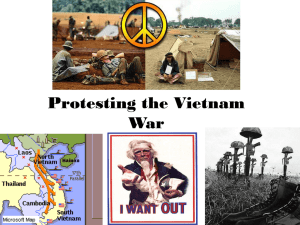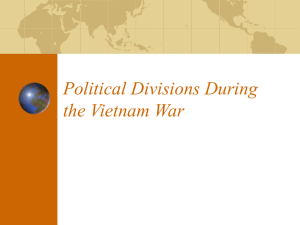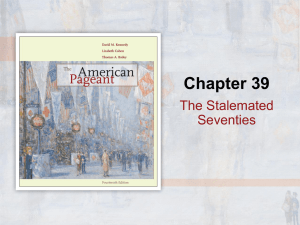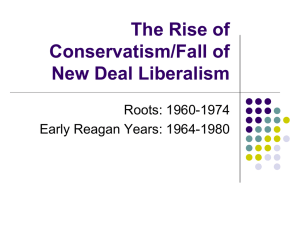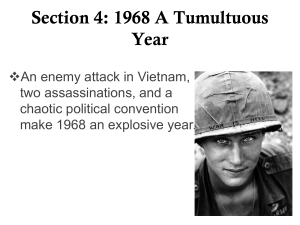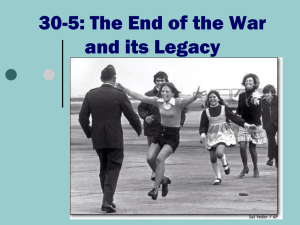10th Grade U.S. History 10th Grade U.S. History Final is on Tuesday
advertisement
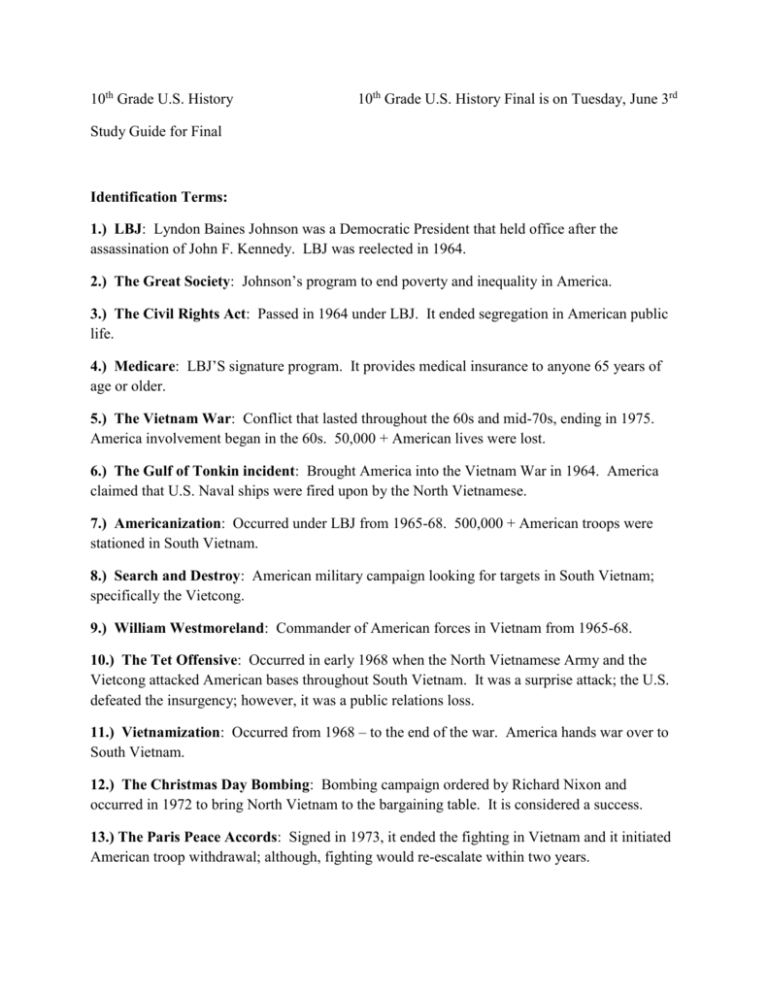
10th Grade U.S. History 10th Grade U.S. History Final is on Tuesday, June 3rd Study Guide for Final Identification Terms: 1.) LBJ: Lyndon Baines Johnson was a Democratic President that held office after the assassination of John F. Kennedy. LBJ was reelected in 1964. 2.) The Great Society: Johnson’s program to end poverty and inequality in America. 3.) The Civil Rights Act: Passed in 1964 under LBJ. It ended segregation in American public life. 4.) Medicare: LBJ’S signature program. It provides medical insurance to anyone 65 years of age or older. 5.) The Vietnam War: Conflict that lasted throughout the 60s and mid-70s, ending in 1975. America involvement began in the 60s. 50,000 + American lives were lost. 6.) The Gulf of Tonkin incident: Brought America into the Vietnam War in 1964. America claimed that U.S. Naval ships were fired upon by the North Vietnamese. 7.) Americanization: Occurred under LBJ from 1965-68. 500,000 + American troops were stationed in South Vietnam. 8.) Search and Destroy: American military campaign looking for targets in South Vietnam; specifically the Vietcong. 9.) William Westmoreland: Commander of American forces in Vietnam from 1965-68. 10.) The Tet Offensive: Occurred in early 1968 when the North Vietnamese Army and the Vietcong attacked American bases throughout South Vietnam. It was a surprise attack; the U.S. defeated the insurgency; however, it was a public relations loss. 11.) Vietnamization: Occurred from 1968 – to the end of the war. America hands war over to South Vietnam. 12.) The Christmas Day Bombing: Bombing campaign ordered by Richard Nixon and occurred in 1972 to bring North Vietnam to the bargaining table. It is considered a success. 13.) The Paris Peace Accords: Signed in 1973, it ended the fighting in Vietnam and it initiated American troop withdrawal; although, fighting would re-escalate within two years. 14.) Henry Kissinger: Richard Nixon’s Secretary of State. He drafted the Paris Peace Accords. 15.) Richard Nixon: Republican President who was elected in 1968 and served until 1972. It was under Nixon’s presidency that the war in Vietnam ended and he was the only President to resign. 16.) The Silent Majority: Term Nixon used to describe the American people who supported his policies and who were not protesting. 17.) O.S.H.A.: Occupational Safety and Health Administration established in the early 1970s. It is still with us today. 18.) C.R.E.P.: Committee to Reelect the President commonly referred as ‘creep.’ It was headed by Nixon’s former Attorney General in 1972. It was the organization that helped fund the Watergate break-in. 19.) Watergate Hotel: Washington D.C. hotel used by the Democratic National Committee (DNC) in 1972. It is where the Watergate break-in occurred. 20.) Archibald Cox: Special prosecutor appointed by Richard Nixon to investigate the Watergate break-in. 21.) Saturday Night Massacre: Cox and Elliot Richardson, Nixon’s Attorney General, are fired by Nixon in October of 1973 because they wanted the Watergate tapes. 22.) Gerald Ford: Richard Nixon’s Vice President who became President in 1974 after Nixon resigned. He also pardoned Richard Nixon. 23.) The Helsinki Accords: Agreement between Ford and the Soviet Union to improve relationships and lower nuclear weapons…if possible. 24.) Jimmy Carter: Democrat from Georgia who wins the 1976 Presidential election. He was also the Governor of Georgia. 25.) Camp David Accords: Signed between Egypt and Israel. Egypt agrees to recognize Israel’s right to exist. 26.) The Iran Hostage Crisis: Began in 1979. Over 50 Americans were held in Iran for over 400 days. They were not released until Ronald Reagan became President in 1981. 27.) Ronald Reagan: Republican President elected from 1980 to 1984. He was the Governor of California. He was elected on the promise to control government spending and to lift regulations on businesses. 28.) Supply-Side Economics: Also known as “Reaganomics” or “Trickle-Down” Taxes should be cut for the rich and businesses; in turn savings would be invested to create more jobs. 29.) The Iran Contra Affair: The U.S. sold weapons to Iran. Money was then given to the Contras in Nicaragua. Col. Oliver North was responsible for the exchange of money. 30.) Saddam Hussein: Dictator of Iraq who invaded Kuwait in 1990. 31.) The Persian Gulf War: Occurred in 1991, also known as Desert Storm. The U.S. and its allies push Saddam out of Kuwait…taking only a month to do so. 32.) The election of 1992: Three run for President: Bill Clinton (D), George H.W. Bush (R) and Ross Perot (I). Clinton won the election. 33.) Bill Clinton: Democrat from Arkansas and former Governor of Arkansas. Two-term President from 1992 to1996 and 1996 to2000. He was a moderate democrat: liberal on social issues and conservative on economic issues. 34.) The Contract with America: Idea drawn up by House Republicans, including the Speaker of the House, Newt Gingrich. The contract opposed many of Clinton’s plans and called for smaller government. 35.) Clinton Impeachment: Bill Clinton was impeached in the late-90s for lying to a Grand Jury regarding an affair with Monica Lewinsky. Chronological Order: A. LBJ takes the presidency after JFKs assassination. B. The Gulf of Tonkin Resolution is passed in Congress. C. The Civil Rights Act is passed ending segregation. D. The Tet Offensive occurs in 1968. E. Johnson refuses to seek reelection as President. F. Richard Nixon becomes President. G. American involvement in Vietnam ends. H. Nixon resigns from office. I. The bicentennial occurs in 1976. J. Ronald Reagan is elected President. K. Oliver North stands trial over the Iran Contra scandal. L. George Bush Sr. is elected President. M. The Persian Gulf War ends with a victory for the U.S. Essay: Listed below are three essay questions. Out of the three, I will choose two to appear on your final. You must answer each one with a detailed response of no less than twelve (12) sentences. 1. List and discuss American involvement in Vietnam starting with JFK and finishing with Nixon. 1st: JFK sends advisers to Vietnam to help South Vietnam fight against the North Vietnamese Army. JFK is assassinated and it is unclear of the direction he would of taken the Vietnam War had he not been assassinated. 2nd: LBJ assumes the Presidency after JFK’s assassination in 1964. LBJ asks Congress for clearance to declare war on North Vietnam after U.S. Naval ships are attacked. Congress passes the Gulf of Tonkin Resolution, allowing for LBJ to attack the North Vietnamese Army and Viet Cong and protect its allies. Americanization of the Vietnam War begins in 1965 when LBJ sends 500,000+ U.S. troops to Vietnam to defend South Vietnam. The Tet Offensive ultimately ruins LBJ’s presidency as the American people realize the war is far from over and worse than portrayed. 3rd: Richard Nixon is elected President and implements the Peace with Honor strategy. While Nixon begins to scale back America’s involvement in the War, he continues to bomb the North and invades Cambodia. 4th: The Paris Peace Accords end fighting in Vietnam and ultimately brings American troops home from war. Then, in 1975, the North invades the South…again. 2. Compare and contrast the presidencies of LBJ and Ronald Reagan. What role did each President believe the federal government should play in people’s lives? Give specific examples. Lyndon B. Johnson believed that big government was the way to make peoples’ lives better. -He instituted a “war on poverty” through his domestic agenda: The Great Society. -The Great Society pushed for social programs (the biggest since the 1930s). Most notable, Medicare and Medicaid emerge. -Johnson also raises taxes. Ronald Reagan is the opposite of Johnson. Reagan believed that government should be small. Reagan scales back many of Johnson’s social programs; however, he does not touch Medicare/Medicaid. Most notably, Reagan cuts taxes for businesses and the rich; via an economic policy known as ‘Supply-side Economics, or ‘Trickle-Down.’ The theory is by cutting taxes for the wealthy, business owners will be able to create more jobs. 3. Compare and contrast the impeachment of William Clinton to the problems faced by Richard Nixon. Richard Nixon was not impeached. Nixon resigned from office, amid a scandal that was made public through the ‘Watergate Tapes.’ Nixon is on record obstructing justice; when he tells his ‘plumbers,’ the men that worked for CREP, to tell the FBI to scale back their investigation into Watergate. For 2 years Nixon fights the release of the tapes and ultimately resigns over the scandal. Nixon’s resignation was not politically motivated; meaning the opposing party (Democrats) was creating a political witch hunt. Democrats and Republicans were united in their case against Nixon. Bill Clinton’s impeachment was politically motivated. House Republicans, led by Newt Gingrich, are stringent that Clinton should be removed from office for lying to a Grand Jury. Bill Clinton was being investigated for mishandlings while Governor of Arkansas. During the investigation, it is revealed that Clinton was having an affair with Monica Lewinsky. Senate Democrats do not vote to impeach Clinton as they do not consider his affair to be one of ‘high crimes and misdemeanors’ as the Constitution deems impeachable offenses.

